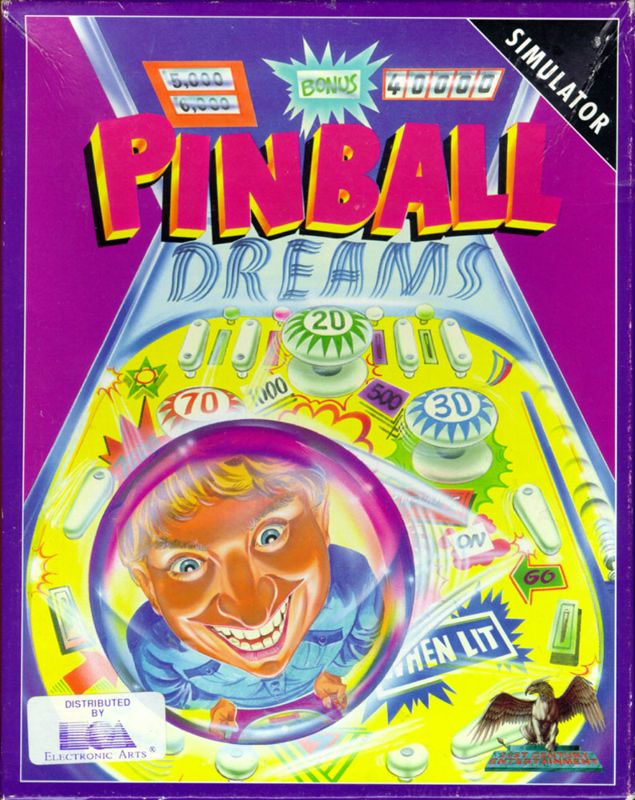 |
GamePlay
The game's four tables each had a theme, as do most real-life pinball & Panchinko machines. The version of Pinball Dreams bundled with the Amiga 1200 had a bug which rendered most of Beat Box's advanced features non-functional.
"Ignition", themed around a rocket launch, planets, and space exploration. The Expert Software's Pinball 2000 port of the game renamed this table "Rocket".
"Steel Wheel", themed around steam trains and the Old West.
"Beat Box", themed around the music industry, charts, bands and tours.
"Nightmare", themed around a graveyard, ghosts, demons, nightmares and generally evil things. Unlike the other tables in the game, the name of the table in the menu did not reflect the name displayed on the table itself—"Graveyard". Some ports of the game (notably the GameTek port to the Game Boy) name this table "Graveyard" in the menu as well.
Development
The ball moves according to reasonably realistic physics, and the game was restricted to using table elements which would also be possible to build in reality. Sound and music were realized with Module files, with this technology several music tracks could be included on the limited space of floppy disks.
Ports:
Commodore Amiga (THE BEST VERSION)
Atari Falcon
Commodore 64: A preview was released at the Breakpoint demo party in April 2006.[5]
Game Boy
Game Gear
Game Boy Advance: Under the title Pinball Challenge Deluxe, with tables added from Pinball Fantasies.
GP32: Released in October 2002.
Super Nintendo Entertainment System: A mostly accurate conversion, including all four tables and near-perfect sound. However, the red "blood" under the top bumper in the "Nightmare" table has been changed to blue and the crosses were removed.
PC: A conversion for DOS based systems by Spidersoft.
iPhone/iPod Touch: Released in January 2009 by Cowboy Rodeo as Pinball Dreaming: Pinball Dreams.
PlayStation Network: Released in November 2009 by Cowboy Rodeo.
iPhone/iPod Touch/iPad: Released in July 2011 by Cowboy Rodeo as Pinball Dreams HD.
OS X: Released in August 2011 by Cowboy Rodeo as Pinball Dreams HD.
Amstrad CPC: Released in October 2019 by BG GAMES.
Reception
Pinball Dreams was a commercial success, selling more than 650,000 copies in its debut year.
Pinball Dreams was overall received positive by press reviews. Electronic Gaming Monthly gave the Game Gear version a 5.8 out of 10, commenting that "Pinball never really worked well on portable systems and Pinball Dreams is no exception. The boards are huge, but the game is a little slow."
In 1993 Computer Gaming World criticized the PC version of Pinball Dreams as having "the worst physical model" of four reviewed games, and disliked the "jerk[y]" scrolling. The magazine said in June 1994 that Pinball 2000 "is an average title at a better than average price". In 1996 the magazine ranked Pinball Dreams as the 119th best game of all time, stating, "Smooth scrolling and great ball physics made this Amiga game a wizard's choice." In 2011, Wirtualna Polska ranked it as the fourth best Amiga game.


No comments:
Post a Comment